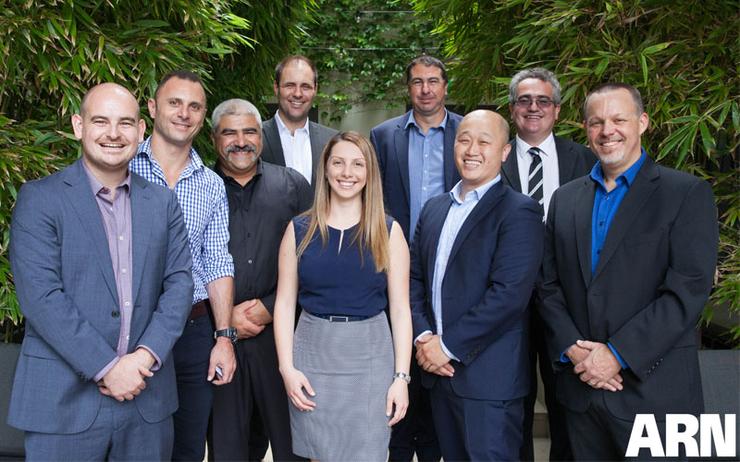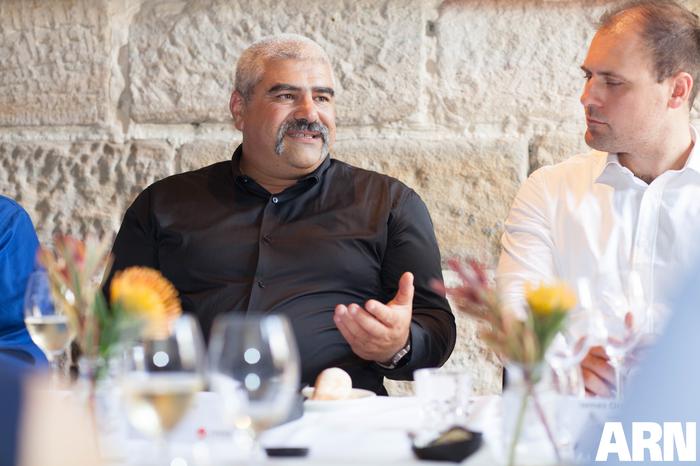
James Henderson (ARN); Itzik Swissa (F5 Networks); George Kassianou (ACK IT Services); James Ormesher (VMtech); Claudia Couzi (AC3); Craig Sims (CCNA); Tony Lam (Dicker Data); Nick Beaugeard (HubOne) and Ryan Delany (Trend Micro)
And perhaps crucially, how this impacts their company’s customers and business operations, and subsequently, managed services agreements.
“Customers are asking different questions,” Kassianou acknowledged. “They will hear something on the news, such as data breach compliance, and they will ask how to become compliant.
“Customers ask MSPs to deliver that solution back to them because customers would rather outsource that to the MSP to make it our problem, not their problem.”
According to Kassianou, contracts are now starting to get written that way, with customers increasingly focused on mitigating risk.
“I wouldn’t necessarily use the word mitigating,” Beaugeard added. “I think customers are just offsetting the risk to somebody else, full stop,”
The word risk, and all it represents in the context of a managed services contract, is a word used with caution throughout the channel, as partners and vendors juggle responsibility up and down the supply chain.
“I’d like to think it’s a team scenario but ultimately if they are singing a managed services contract with VMtech, then we are providing a service to that customer,” Ormesher added. “We are making the technology choices underneath and customers are even saying that they don’t care about the decision we make.
“This means it’s the responsibility of the partners to carefully select vendor solutions because it’s important to have those service agreements in place, alongside added support mechanisms and the ability to escalate any issues if required.

“Our view is that the customer comes to us and therefore it’s our relationship. Then it’s about negotiating a contract that is acceptable to both parties, has an acceptable level of risk because the more risk the customer passes on, then the more cost.”
Delving deeper, Couzi said certain customers are “very acutely aware of risk”, choosing to work directly with a vendor instead, before bringing in an MSP to manage the IT.
“They prefer that approach but others prefer to wrap it all up and the contracts will definitely reflect whatever approach is taken,” Couzi said. “It then comes down to the MSP to ensure they have the right relationships and arrangements with the different vendors in place, which also involves the right levels of support and mitigation.”
Such an approach has resulted in a recalibration of the channel, as partners assume the role of the customer when procuring technologies through the traditional supply chain.
“We make the call,” Couzi explained. “MSPs used to have a splash of logos on their websites which showed they partnered with every vendor but there’s been a huge wave of maturity in the industry, on both sides of the channel.
“Vendors have also become more stringent in who they partner with and we’ve seen this play out through an increase in certifications and revenue commitments, which in its own right has contributed to a reduction in logos.
Therefore, customers know now that when an MSP carries a certain logo, there is a strong level of commitment behind it rather than simply applying to be a partner and the vendor saying yes.”
With regards to risk and responsibility, Sims said customers — in general — “don’t care” which vendor technology sits behind an outcome, again placing the power of selection in the hands of the provider.
“We’re seeing a huge move away from vendors owning the customer from that perspective,” he said. “This means the MSP is taking on that management and risk. As our business has developed to take on more solution sets, we have aligned with fewer vendors.”

For Kassianou, once a customer decides to dictate technology or vendor selection to the MSP, they are subsequently placing risk back on themselves, risk that is reflected in the contract.
“If they ask for an outcome then as long as you deliver the outcome, the technology doesn’t matter,” Kassianou added. “Generally, the smaller businesses just want an outcome but the larger organisations can be more specific around technologies and vendors. But once they do that, they must bring more to the table.
“We don’t use multiple vendors, we have placed strategic and solid bets and they are not based on price or profit. Our decisions are based on the level of service that our customers will receive. By limiting ourselves to trusted vendors, we know we can deliver a known result to customers.
“We know the products inside and out, we know we have leverage and we know that we can take our business elsewhere if a vendor doesn’t come to the table. Vendors realise this too and they are now coming to the table.”
Through operating in a specialised industry, Beaugeard said HubOne also spends time in the boardroom with customers, in a bid to outline key roles and responsibilities to avoid any contractual confusion going forward.
“We educate the board because it doesn’t matter what contract you have in place, they are still responsible for business continuity, security and keeping customer data safe,” he said. “In a sales process, that level of conversation actually goes in your favour and creates a far better relationship because providing shareholder value and protecting customer assets is the responsibility of the directors.”
Going forward, MSPs will be expected to carry more responsibility and risk, creating a need for vendors to meet the channel halfway in a bid to better service the customer.
“From an F5 perspective, as a vendor we are just as responsible,” Swissa added. “When you deliver a technology and problems arise, you must be available and on hand to help, it’s very much a partnership and we are as committed as the MSP in that respect.
“We don’t see the contractual aspect as much because that’s with the MSP but we are committed to the same SLA and the same standards — we are in it for the long haul in that respect.”
This ARN Roundtable was sponsored by F5 Networks and Trend Micro. Photos by Christine Wong.




